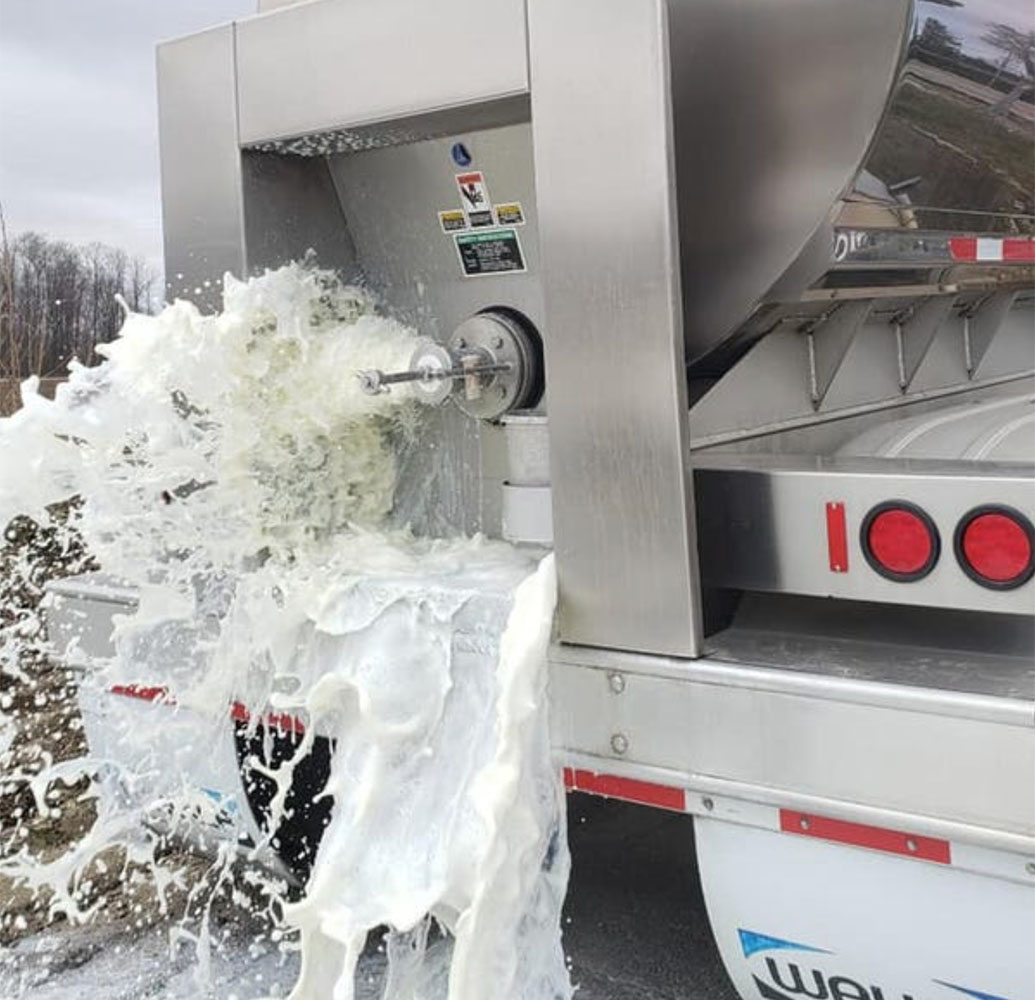45 dairy farmers in Wisconsin and Minnesota were ordered to dump good milk in June. There was nothing they could do to prevent it, their food processor was causing wastewater issues and was ordered to shut down.
Source: Wisconsin, Minnesota dairy farmers are forced to dump thousands of gallons of milk (archive)
The system of milk hauling and processing is so overloaded in the Upper Midwest that any problem with a dairy plant is catastrophic. When one plant was told it had to close for at least 30 days because of wastewater issues, the 45 farms in Wisconsin and Minnesota that ship to that plant were told they would have to start dumping their milk.
…
The creamery’s shutdown is tied to a discharge rule that limits the amount of fat, wax, tallow, grease or oil from animal or vegetable origin in excess of 100 milligrams per liter, because those substances have the potential to turn solid and obstruct the flow in public sewers.
The creamery’s industrial wastewater permit was suspended at midnight on June 5, and the Metropolitan Council cut it off from the Hastings Wastewater Treatment Plant for 30 days – until the plant can meet certain requirements.
…
Emily Tweten, a fifth-generation dairy farmer, drove from Winona County to be at that meeting. As one of the 45 farmers who sell raw milk to the creamery, she told reporters that if the plant goes down, “we would have to sell our cows. We would be done with our business.”
Lack of labor was also cited as a reason for food processors in the region not being able to handle the volume of milk being produced, that’s also not the farmer’s problem. It only becomes the farmer’s problem when they are only permitted by law to sell to food processors for pasteurization.
Big plants, big outages
The same phenomenon could be observed in 2020: Wisconsin farmers forced to dump milk as coronavirus slams a fragile dairy economy
About 7 o’clock Tuesday night, Golden E Dairy got the call that any dairy farmer would dread. They were being asked to dump 25,000 gallons of fresh milk a day because there was no place for it to go as the marketplace for dairy products has been gutted by the closure of restaurants, schools, hotels and food-service businesses.
An hour later, the family-run farm near West Bend opened the spigot and started flushing its milk into a wastewater lagoon — 220,000 pounds a day through next Monday.
It was surreal, said Ryan Elbe, whose parents, Chris and Tracey Elbe, started the farm in 1991 with about 80 cows and grew it into an operation that today milks 2,400.
“We thought this would never happen,” Elbe said. “Everybody’s rushing to the grocery store to get food, and we have food that’s literally being dumped down the drain.”
Due to an array of things going on in that micro era, some unavoidable and some self-inflicted, many food processing plants couldn’t process the volume of milk being produced.
Dairy farmers licensed for pasteurized milk are only allowed to sell to processors, they couldn’t sell or give their milk to anyone else, so they were ordered to dump perfectly good food. All of this was going on while grocery stores were rationing milk sales to the consumer.
Let farmers sell their own milk!
Farmers who produce milk for pasteurization can only sell their raw milk to food processing/ pasteurization plants.
If those food processors are not accepting milk, for any reason, they cannot sell to anyone else. Even if the informed customer plans on pasteurizing that milk, or simmering it to make mozzarella, it is a crime for that farmer to sell their perfectly good milk to any entity that is not the owner of a licensed food processing facility.
When the local food processor is facing issues that limit their intake volume, processing capacity, output volume, or any other problem that prevents them from buying the farmer’s milk, the farmer is out of luck.
Since food processors are the only customers, they get to determine the price they are willing to pay for milk. Farms are then informed what the processor is willing to pay. Take it or leave it.
Dairy processors under mandatory pasteurization represent a bottleneck in the food supply chain that forces food to go to waste, strangles the income of farmers by eliminating their ability to price their own milk. In a case like this, the massive (centralized) volume of milk the co-op is processing posed a threat to local infrastructure.
Raw milk farmers unaffected
Farmers who produce raw milk for human consumption are not bottlenecked by food processing plants. They can sell their milk on the farm, or through deliveries and the grocery store if state laws permit, and they can set their own prices.
If my farmer needs an extra buck, they can raise the price and I’ll find out at the grocery store. That allows them to grow and stay in business.
When organic pasteurized milk was off the shelves for two weeks in early 2020, raw milk didn’t skip a beat. Raw milk kept on flowing into bottles and grocery stores. Organic pasteurized consumers were out of luck, until they started noticing what was in stock.
